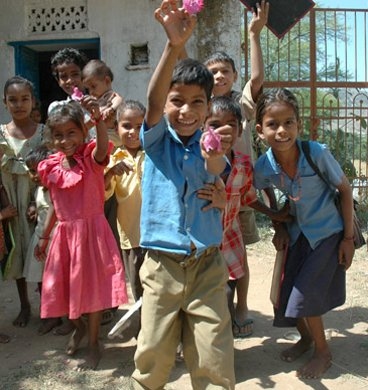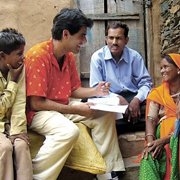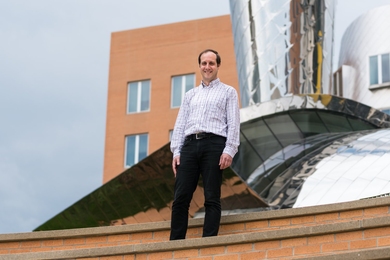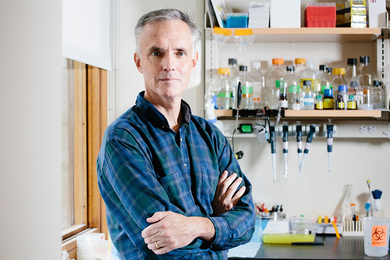More than 1,000 people from across the globe gathered at MIT on Dec. 7 to celebrate the 10th anniversary of the Abdul Latif Jameel Poverty Action Lab (J-PAL). The program featured talks, stories from the field, videos, and panel discussions with researchers, policymakers, staff, and partners — and a musical tribute from Bono, lead singer of U2 and antipoverty activist, singing "Happy Birthday" to J-PAL via video webcast.
Established in 2003 as a research center within the Department of Economics in MIT's School of Humanities, Arts, and Social Sciences (SHASS), J-PAL's founders pioneered the use of randomized controlled trials to test the effectiveness of antipoverty programs. Today, J-PAL comprises a global network of nearly 100 researchers working in 55 countries.
A pioneering approach
“J-PAL fits in perfectly with MIT’s mission and values — to make the world a better place through service to humanity,” said MIT President L. Rafael Reif, who addressed the crowd during the morning session of the daylong anniversary conference, J-PAL@TEN, which took place in Kresge Auditorium. “Everyone here is concerned with questions of deep moral importance — and that is how to relieve human poverty and the suffering it creates.”
To date, J-PAL has completed 447 randomized evaluations, addressing such questions as: do free bed nets help the fight against malaria? [yes]; does vocational training improve youth employment? [sometimes]; does electronic monitoring improve attendance among health professionals? [no]; and do deworming programs boost school performance? [yes].
Measurable impact
The impact of J-PAL’s global network of researchers can be measured in the millions of people around the globe whose lives have been improved through J-PAL research, including 65.6 million who have received subsidized rice, 33.89 million who have received remedial education, and 59.14 million who have benefited from deworming programs.
Extraordinary supporters
J-PAL's results do not come easily, J-PAL Deputy Director Iqbal Dhaliwal emphasized in his talk. “Policy is really, really hard to change,” he said. “Institutions have constraints. People are hard to change. People rely on instincts, ideology, and inertia.”
Running research projects to provide evidence of what works, and then communicating results to ensure that proven programs are scaled up, takes an extraordinary amount of support. J-PAL Director Abhijit Banerjee used his time on stage to express his gratitude for all the help J-PAL has received in the past decade — beginning with MIT’s support for the lab’s launch.
“MIT had faith in us," Banerjee said. He went on to credit J-PAL’s growth to financial support — from the Jameel family, SHASS, and others — and to the on-the-ground legwork provided by the lab’s many partners in impoverished areas worldwide and the government leaders who put J-PAL’s research findings into action through policy.
J-PAL's program areas and number of current projects include:
J-PAL’s broad spectrum of supporters was reflected in the event’s speaker list, which included:
A compelling mission
What drew so many people from as far away as Brazil, India, Tanzania, Saudi Arabia, and Sweden to MIT on a chilly December Saturday? For some, it was simply the power of J-PAL’s mission combined with the demonstrated success of its evidence-based approach. “When I was a student at MIT pursuing my passion in science,” said Tiantian White ’13, “I often struggled thinking how I can apply all the knowledge from my statistics and experimental biology class to poverty alleviation, something I am equally passionate about.” Now working as a policy analyst at J-PAL, White said she has discovered that “the ability to apply the scientific approach to problem-solving and the understanding of rigorous evidence can be tremendously powerful in tackling extreme poverty.”
Persistence
Hearing about J-PAL’s humble beginnings was particularly inspiring, White said. “We sometimes forget how much we can do to make this world a better place,” she said. “The J-PAL story at J-PAL@TEN is one that reminds us of that fact.”
Other attendees were drawn as much by the speaker list as by J-PAL’s record of accomplishment. Tracy Ware, for example, came to see J-PAL Director Esther Duflo. “She has rock-star status,” said Ware, who works for Empower Dalit Women of Nepal in North Waltham, Mass., and who took the massive open online course “The Challenges of Global Poverty” that Duflo teaches with Banerjee.
In her talk, titled “Getting It Wrong, Trying Again, Getting It Right (Sometimes),” Duflo focused on the challenges J-PAL faces going forward rather than highlighting the accomplishments of the past. “How have we been so slow?” she said. “One hundred sixty-five million [impacted by J-PAL] is really very little in comparison to the hundreds of millions who stand in need.”
But although J-PAL’s progress can seem slow when measured against the scale of the world’s problems, it is nonetheless impressive. “In 10 years I’ve learned some things," Duflo said. "Our role is to chip away at the problem long enough and persistently enough so we can identify the levers that can improve the situation. To change lives we have to change minds. And I’m pretty sure we can do that.”
Steady growth
J-PAL’s chipping-away has clearly been relentless. From one small office at MIT in 2003, the lab has grown to cover the world with six regional offices. This summer, the organization launched the newest of the six: J-PAL North America.
Professor Amy Finkelstein, who directs J-PAL North America with Professor Lawrence Katz of Harvard, emphasized in her talk that J-PAL’s methods can have significant impact even in the developed world. Describing her work on the Oregon Health Insurance Study, a randomized study of the effects of expanding access to health insurance, Finkelstein noted that something important changes when a program’s results are measured scientifically. “What’s really gratifying to me is that no one is arguing about the results; they’re arguing about what it means,” she said.
The next decade begins
To wrap up the day, Banerjee, Duflo, and Glennerster joined fellow J-PAL Director Benjamin Olken in a panel discussion titled “J-PAL: The Next Decade.” Olken said he expects J-PAL to increase its involvement with governments to ensure that policies have strong evidentiary support. And Banerjee said he expects J-PAL’s research to take off in new directions. “People will think of ways to measure things we don’t think can be measured, like corruption,” he said.
Since J-PAL's affiliated professors set their own research agendas, it’s impossible to predict exactly what questions J-PAL will tackle next, Glennerster pointed out. "We have a belief in a bottom-up approach," she said, "and so a large part of our role is to encourage the creativity of the researchers on the ground. That’s where the magic happens."
Established in 2003 as a research center within the Department of Economics in MIT's School of Humanities, Arts, and Social Sciences (SHASS), J-PAL's founders pioneered the use of randomized controlled trials to test the effectiveness of antipoverty programs. Today, J-PAL comprises a global network of nearly 100 researchers working in 55 countries.
A pioneering approach
“J-PAL fits in perfectly with MIT’s mission and values — to make the world a better place through service to humanity,” said MIT President L. Rafael Reif, who addressed the crowd during the morning session of the daylong anniversary conference, J-PAL@TEN, which took place in Kresge Auditorium. “Everyone here is concerned with questions of deep moral importance — and that is how to relieve human poverty and the suffering it creates.”
To date, J-PAL has completed 447 randomized evaluations, addressing such questions as: do free bed nets help the fight against malaria? [yes]; does vocational training improve youth employment? [sometimes]; does electronic monitoring improve attendance among health professionals? [no]; and do deworming programs boost school performance? [yes].
Measurable impact
The impact of J-PAL’s global network of researchers can be measured in the millions of people around the globe whose lives have been improved through J-PAL research, including 65.6 million who have received subsidized rice, 33.89 million who have received remedial education, and 59.14 million who have benefited from deworming programs.
Extraordinary supporters
J-PAL's results do not come easily, J-PAL Deputy Director Iqbal Dhaliwal emphasized in his talk. “Policy is really, really hard to change,” he said. “Institutions have constraints. People are hard to change. People rely on instincts, ideology, and inertia.”
Running research projects to provide evidence of what works, and then communicating results to ensure that proven programs are scaled up, takes an extraordinary amount of support. J-PAL Director Abhijit Banerjee used his time on stage to express his gratitude for all the help J-PAL has received in the past decade — beginning with MIT’s support for the lab’s launch.
“MIT had faith in us," Banerjee said. He went on to credit J-PAL’s growth to financial support — from the Jameel family, SHASS, and others — and to the on-the-ground legwork provided by the lab’s many partners in impoverished areas worldwide and the government leaders who put J-PAL’s research findings into action through policy.
J-PAL's program areas and number of current projects include:
- Agriculture — more than 34 projects in 15 countries
- Education — more than 106 projects in 29 countries
- Energy and Environment — more than 17 projects in 12 countries
- Finance and Microfinance — more than 155 projects in 35 countries
- Health — more than 103 projects in 31 countries
- Labor Markets — more than 50 projects in 22 countries
- Political Economy and Governance — more than 95 projects in 26 countries
J-PAL’s broad spectrum of supporters was reflected in the event’s speaker list, which included:
- Major donors — notably Mohammed Abdul Latif Jameel, chairman of Abdul Latif Jameel Community Initiatives, after whose late father J-PAL is named;
- J-PAL leadership — among them Executive Director Rachel Glennerster, Director Esther Duflo, and Director Banerjee;
- Key partners from in-country programs — such as Rukmini Banerji, director of programs for Pratham, an education program for underprivileged children in India, and Juan Cristóbal Beytia Reyes, SJ, chaplain of Techo, which builds housing for the impoverished of Latin America; and
- Governmental leaders — among them Martin Hirsch, former high commissioner of France, and Alan Krueger, former chairman of the U.S. Council of Economic Advisers.
A compelling mission
What drew so many people from as far away as Brazil, India, Tanzania, Saudi Arabia, and Sweden to MIT on a chilly December Saturday? For some, it was simply the power of J-PAL’s mission combined with the demonstrated success of its evidence-based approach. “When I was a student at MIT pursuing my passion in science,” said Tiantian White ’13, “I often struggled thinking how I can apply all the knowledge from my statistics and experimental biology class to poverty alleviation, something I am equally passionate about.” Now working as a policy analyst at J-PAL, White said she has discovered that “the ability to apply the scientific approach to problem-solving and the understanding of rigorous evidence can be tremendously powerful in tackling extreme poverty.”
Persistence
Hearing about J-PAL’s humble beginnings was particularly inspiring, White said. “We sometimes forget how much we can do to make this world a better place,” she said. “The J-PAL story at J-PAL@TEN is one that reminds us of that fact.”
Other attendees were drawn as much by the speaker list as by J-PAL’s record of accomplishment. Tracy Ware, for example, came to see J-PAL Director Esther Duflo. “She has rock-star status,” said Ware, who works for Empower Dalit Women of Nepal in North Waltham, Mass., and who took the massive open online course “The Challenges of Global Poverty” that Duflo teaches with Banerjee.
In her talk, titled “Getting It Wrong, Trying Again, Getting It Right (Sometimes),” Duflo focused on the challenges J-PAL faces going forward rather than highlighting the accomplishments of the past. “How have we been so slow?” she said. “One hundred sixty-five million [impacted by J-PAL] is really very little in comparison to the hundreds of millions who stand in need.”
But although J-PAL’s progress can seem slow when measured against the scale of the world’s problems, it is nonetheless impressive. “In 10 years I’ve learned some things," Duflo said. "Our role is to chip away at the problem long enough and persistently enough so we can identify the levers that can improve the situation. To change lives we have to change minds. And I’m pretty sure we can do that.”
Steady growth
J-PAL’s chipping-away has clearly been relentless. From one small office at MIT in 2003, the lab has grown to cover the world with six regional offices. This summer, the organization launched the newest of the six: J-PAL North America.
Professor Amy Finkelstein, who directs J-PAL North America with Professor Lawrence Katz of Harvard, emphasized in her talk that J-PAL’s methods can have significant impact even in the developed world. Describing her work on the Oregon Health Insurance Study, a randomized study of the effects of expanding access to health insurance, Finkelstein noted that something important changes when a program’s results are measured scientifically. “What’s really gratifying to me is that no one is arguing about the results; they’re arguing about what it means,” she said.
The next decade begins
To wrap up the day, Banerjee, Duflo, and Glennerster joined fellow J-PAL Director Benjamin Olken in a panel discussion titled “J-PAL: The Next Decade.” Olken said he expects J-PAL to increase its involvement with governments to ensure that policies have strong evidentiary support. And Banerjee said he expects J-PAL’s research to take off in new directions. “People will think of ways to measure things we don’t think can be measured, like corruption,” he said.
Since J-PAL's affiliated professors set their own research agendas, it’s impossible to predict exactly what questions J-PAL will tackle next, Glennerster pointed out. "We have a belief in a bottom-up approach," she said, "and so a large part of our role is to encourage the creativity of the researchers on the ground. That’s where the magic happens."
Story prepared by MIT SHASS Communications
Editorial and Design Director: Emily Hiestand
Senior Writer: Kathryn O’Neill







